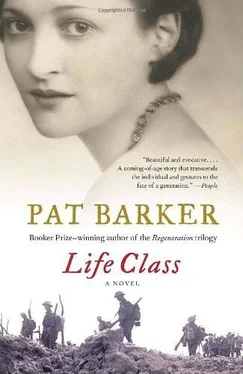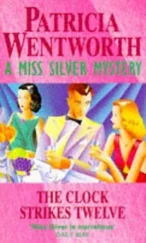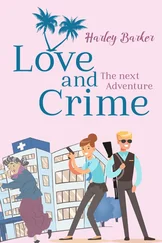Yesterday we had our first snow. As evening was falling, we walked out into it. All the heaps of rubble and the furniture that had been blown or dragged into the street were coated with snow and the cobbles in the road glittered. I slept long and deep, as people do in snow, but now it’s begun to melt. We’re all sorry to see it go. Nobody here minds the cold, even in the trenches, because you can cope with it. It’s this endless, drenching rain we don’t like.
Life here is so uneventful I really can’t think of much to write about. It’s not at all what I expected, and not what I wanted either. But there’s certainly no need to worry about me. I am perfectly, disgracefully safe.
Elinor to Paul
Yes, I know. No letter for a long time. Yours has been lying on the table beside my bed reproaching me for I don’t know how long. It’s so hard to imagine where you are. I can put you in that little room overlooking the roofs and in the restaurant we went to together, but I know you’re not there now. I liked your description of the ruins though. I wonder where the people have gone?
I’ve been working hard day after day, so hard my head feels bashed in. When I can’t stand it any longer I go up to the Heath and watch people swimming, which they still do even in the middle of winter. Pallid creatures, some of them decidedly plump, and they splash and harrumph about like porpoises and their skin turns mottled blue and red and we’re supposed to find it beautiful but it isn’t. And then you see the wounded men in their blue uniforms being pushed along the paths in wheelchairs. They seem to congregate in the Vale of Health as if the clean air might make their stumps sprout. And back at the Slade where I spent so many happy girlish hours being patted on the back — oh platonically of course — by Tonks and winning prizes and scholarships and all that sort of rubbish, some portly madam is even now mounting the dais and a new class of young ladies prepares to contemplate the Human Form Divine and I think –
But that’s the problem, Paul. Always was. I don’t think, I only see.
I expect all this is really about Ottoline and her friends. She kisses me now whenever we meet and introduces me and shows me off and I spend most of my time feeling inferior — rightly, for so I am — and trotting out my little tale about being in Ypres during the bombardment, a tale which has grown so stale in the telling that even I no longer believe it happened.
But I have been working, Paul, and I think at last I’ve done something good. In the ladies’ cabin on the night crossing there was a woman breastfeeding her child and her whole body seemed to be a wax candle feeding the child’s flame. It made an enormous impression on me. Anyway it’s the first thing I’ve ever done that doesn’t reek of Sladery and winning prizes and wanting to be praised.
I do miss you so much, but it gets harder and harder to keep you in my mind. You’re like a ghost almost, fading in the light of dawn. Sometimes I close my eyes and try to summon up your face and I can’t see you any more. Then at other times I hear your voice so clearly I turn round expecting to see you standing there, and every time it happens there’s the same pang of loss. Can’t you send me a sketch of where you are? It would help me a lot if I could picture you somewhere definite, not just have letters dropping in from outer space.
Paul to Elinor
A sketch of where I am might help you, young woman, but it would very likely get me shot! I don’t think our letters get censored very often, but it does happen. We have to hand them in with the envelopes open. Still, I do see what you mean. I was quite shocked when you said you were thinking of moving and leaving the Slade. A large part of my survival strategy is going back (in my mind, obviously!) to known places and finding you there. Anyway, a sketch would be difficult — to say the least! — so I’ll have to do the best I can with words.
The most important place isn’t a place at all. The bus. You saw ambulances like her in the square — red crosses, canvas sides. She takes five stretcher cases or ten walking wounded — and that’s about all the good you can say of her. She regularly stalls and her crank handle could break a man’s wrist. So picture me then in darkness and driving rain, up to my knees in mud and slush, pleading with her to start first time. All the time going round and round in my head there’s a couple of lines of verse.
A red cross knight forever kneel’d
To the lady on his shield …
I can’t remember where it comes from and it’s driving me mad. The only way I can chase it out of my head is to sing very loudly. One night I was bellowing ‘God Save the King’ at the top of my voice when a column of French soldiers marched past. They obviously thought they should keep their end up and broke into ‘La Marseillaise’.
Watching ambulance lumber round the turning circle at the hospital I used to think they were huge, but inside the cabin’s rather cramped. The stretchers are level with the back of the driver’s seat so the groans and cries go right into your ears. Sometimes they seem to be inside your own head. You can hear pleas for water but you can’t answer them, only drive hell for leather down dark, rutted, congested roads. I never get used to the screams that are jolted out of people when I get it wrong and bump into a shell-hole. Sometimes they die on the way to hospital. That’s hard. I’m surprised how difficult it is. I thought because I didn’t have time to get to know them I wouldn’t mind so much. Instead I feel personally responsible in a way I never did on the ward, where you were always part of a team. One morning driving back to base just before dawn I found myself crying, and yet nothing worse had happened on that trip than on any other. Big fat baby tears trickling down my cheeks. I didn’t even feel particularly upset. It seemed to be something my body had decided to do without consulting me.
The other place is a place — our common room, which is where I’m writing this. It’s comfortable and warm, in spite of, or because of, the rain that pelts down outside. There’s an oil lamp on the desk and Lewis is writing one of his endless letters home. Do you know he writes to his mother every day? I can’t imagine what he finds to say. The wood stove is blazing away, and there’s a card game going on at the next table. We’re on duty but no calls have come in yet, though the guns have started up, louder than usual, I think, so perhaps there’s something brewing. Every time the gun near us goes off Lewis’s inkwell gives a little jump. This table was taken out of a schoolroom and has boys’ initials carved all over it. Some of the carving’s so deep it must have taken ages to do. Dates too. I wonder where they are now, those boys? So this is where I am, thinking of you (as always). And now somebody’s come in with a tray of cocoa. The door opens, and the wind lifts the thin carpet and sends dead leaves rattling across the floor, but inside we’re warm. Full of hot cocoa and fingers crossed for a quiet night. Goodnight, my love. I can’t say I wish you were here, and I can’t really, except at the most superficial level, wish I were there, but I do wish with all my heart that we were together in some place where the war couldn’t find us.
Elinor to Paul
I suppose my headline news is that I’ve sold two paintings. The mother and baby from the ferry crossing, and another one I did of some schoolgirls in a park. Based on one of the drawings I did when I came to see you. Dad took one look at the mother and child and roared with laughter. He says if my idea of motherhood ever catches on there’ll be no need for Marie Stopes. I got five pounds each! Of course I can’t think what to spend it on. Not that I don’t need masses of things, but it’s my first painting money so I feel I should buy something special with it, but nothing seems special enough.
Читать дальше












